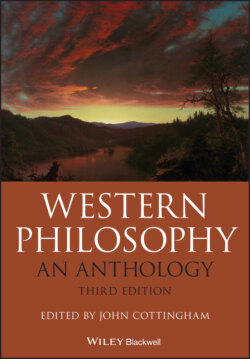Читать книгу Western Philosophy - Группа авторов - Страница 47
4 New Foundations for Knowledge: René Descartes, Meditations*
ОглавлениеBoth in Plato’s search for eternal, unchanging objects of knowledge, and in Aristotle’s definition of true knowledge as being of that which cannot be otherwise, we can see the idea that what qualifies as knowledge must have a certain stability. Many centuries later, at the start of what is known as the ‘early modern’ period, this theme was taken up, though in a very different way, by René Descartes, whose writings had a profound effect on the subsequent development of philosophy in general and epistemology in particular.
Descartes became struck by the instability and unreliability of many of the accepted doctrines he had been taught as a student. In his Discourse on the Method (Discours de la méthode) published anonymously in 1637, he remarked of the philosophy he had learnt at school that despite having been taught for many centuries, it contained ‘no point that was not disputed and hence doubtful’. And as for other sciences, in so far as they borrowed their principles from philosophy, ‘nothing solid could be built on such shaky foundations’. In his masterpiece, the Meditations on First Philosophy, published in Latin in 1641, Descartes records his determination to sweep away all previously accepted opinions, and start afresh. His project is nothing less than the reconstruction of knowledge from the foundations upwards. To pursue this goal, he devises a systematic method of doubt: anything that can be called into question, for any reason whatever, will be discarded. Previous beliefs acquired via the senses are all jettisoned, on the grounds that the senses have sometimes proved unreliable. Even such straightforward beliefs as ‘I am now sitting by the fire’ are doubted, on the grounds that I might be dreaming; and the argument is then broadened to question whether I can know for certain that anything external to the mind really exists. The argument next turns to the abstract propositions of mathematics, which seem to be immune from the previous doubts since their truth does not depend on whether their objects actually exist; but even these are called into question by the thought that an all-powerful God might make me go wrong ‘every time I add two and three’. To reinforce all the doubts, an imaginary scenario is introduced of a ‘malicious demon of the utmost power who employs all his energies to deceive me’. Finally, at the start of the Second Meditation, the meditator reaches his ‘Archimedian point’. No matter how much he is deceived, there is one truth that cannot be doubted: ‘I am, I exist, is certain, every time it is conceived in the mind.’ This, elsewhere expressed in the famous formula ‘I am thinking therefore I exist’ (in French, je pense donc je suis, or, in Latin, cogito ergo sum), is the first principle of Descartes’s new philosophy.
